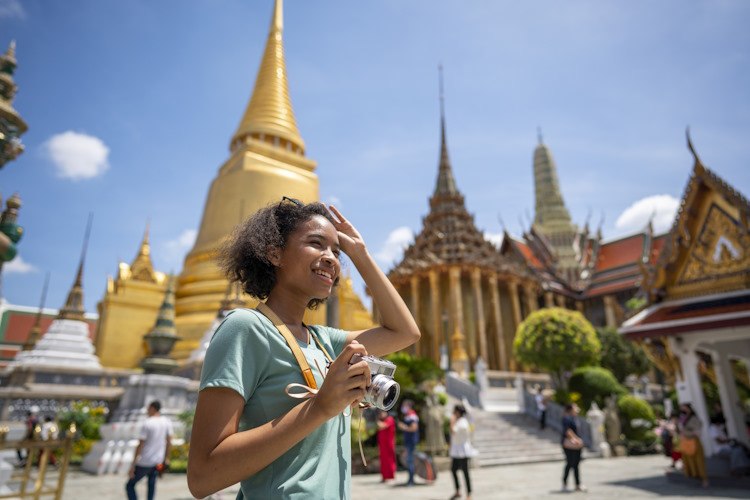Reading time: 5 minutes

Amazing beaches, bustling night life and friendly locals – it's little wonder Thailand is such a popular holiday spot for Australians. However, like any country in the world there are tourist scams and local laws that can leave holidaymakers stumped.
That's why we've put together some safety tips and advice to make your trip to Thailand as smooth as possible.
Common scams in Thailand
Some of the most common scams to look out for include:
Fake gems: This scam is common within many of the major cities and involves unsuspecting tourists believing they are buying valuable gems for a fraction of the market price. Even if you realise the truth afterwards, the store 'owner' has packed up and moved on, leaving you with worthless pieces of glass.
Tuk-tuk drivers: Many drivers may reel you in with the promise of a free tour around the city, stopping off at some of the best jewellers and tailors along the way. Along with the store owners, they may pressure and persuade you to purchase things, sometimes getting aggressive because they earn a percentage and commission from sales.
Bars: Targeting young, male travellers, Thai girls will approach and offer to take them to a fun, local bar where they will order and 'buy' drinks. By the time the bill arrives, they will be gone, and a large bill is left in their place for you to pay.
Vehicle rental scams: If you're planning on hiring a car, motorbike, or jet ski when in Thailand, be cautious of who you're renting from. Australians have been harassed or threatened by transport operators who claim the vehicle has been damaged. This scam is particularly popular on touristy beaches in Phuket, Pattaya, Koh Samui and Koh Phangan.
Should you plan on hiring a vehicle, follow these steps for a safe deal:
- Read online reviews of local travel operators
- Before driving, ask about and check for existing damage to the vehicle
- Before leaving the dealership, take photographs of the vehicle (even underneath) to keep for your records
- Never use your passport as a deposit or guarantee – pay a cash deposit instead
Tourism police
Thailand's main tourist destinations have special police units that help foreign travellers. If you think you've been scammed, call the Tourist Police on 1155.
Crime in the major tourist hot spots
Bangkok
Drink and food spiking is often reported within popular backpacker and tourist destinations such as Khao San Road, Pat Pong, and Soi Cowboy in Bangkok. Non-confrontational and petty crimes are the most common, including purse-snatching, pickpocketing and theft. Thieves may use razors to cut into bags and sneakily steal valuables. Although violent crimes are rare, they are most likely to happen at night, when tourists are drinking. Stay with friends at all times and avoid suspicious people and places.
Phuket
Similar to Bangkok, petty crimes are the most common in Phuket. Tourists are advised to keep valuables secure on their person and to watch for snatch-and-grabs in busy areas. Bags have also been stolen from unsuspecting motorcyclists as they are stationary in traffic.
Chang Mai
Credit/debit card fraud is common in Chang Mai and other areas of Thailand. Skimming devices are often used to copy card numbers for future transactions. Always keep your cards secure, regularly check your accounts and if in doubt, use cash.
Terrorism in Thailand
Currently, the biggest areas of concern are the provinces of Pattani, Yala, and Narathiwat – Smartraveller advises not travelling to those areas. Thai authorities also warn of possible terrorist attacks in heavily populated tourist areas such as Phuket and Bangkok, especially around symbolic dates or holidays. Visitors are advised to exercise a high level of caution when visiting.
Driving in Thailand
Thailand has something for everyone, with tonnes of incredible places to explore.
But how do you get from one amazing destination to the next? Here, we break down everything you need to know about navigating Thailand.
Do I need a licence to drive in Thailand?
To drive in Thailand, you need to have a current Australian licence as well as an International Driving Permit (IDP), according to the Australian Embassy, Thailand. Though it is not a licence itself, this will act as proof of validation of your Australian drivers' licence.
If you are staying in Thailand for a while, and wish to get a Thai driving licence, contact or visit the Depart of Land Transport to confirm your eligibility and the necessary documentation. You can reach them at 1032 Phahonyothin Road, Chatujak District, Bangkok (Mo Chit BTS station), phone: 02 271 8888 extensions 4201, 4202 or 4203.
Driving laws in Thailand
Before you get behind the wheel, bear in mind that Thailand has one of the world's highest rates of traffic-related fatalities, especially for motorbikes. Here are some laws and rules you need to be aware of when driving in Thailand:
- You must be 18 or older to drive
- You drive on the left side of the road
- Use of mobile phones while driving is prohibited unless using a hands-free device
- The legal BAC limit is 0.5 mg per one litre of alcohol
- Seat belts are mandatory in the front seat
- Motorcyclists must wear a helmet
Traffic can be quite busy in the cities and popular tourist areas like Phuket. Drivers are typically polite and don't show much road rage, so be sure to act courteously on the road as well. If you are in someone's way, other drivers will indicate this by flashing their headlights so act accordingly.
Because Thailand is such a motorbike-friendly place, you need to be cautious of where they are at all times. When you are exiting a car, make sure you look before opening the door as motorcyclists often use the shoulder of the road to get around stopped traffic.
Laws and customs to be aware of when visiting Thailand
One of the most exciting parts about travelling is exploring the way a country works – figuring out the new culture and lifestyle. But this is especially true when visiting a country like Thailand.
To be respectful (and keep out of trouble) there are a couple of unusual laws you should be aware of before visiting.

Respect the royal family
It's more than disrespectful to speak ill of any member of the royal family – it's a crime. The country adores their monarchy – so much that the country goes into a period of mourning that can last an entire year when a member of the royal family dies. This happened in 2016 when King Bhumibol Adulyadej passed away at 88. If you were in Thailand during this time, you were expected to refrain from any celebrations (like the famous Full Moon Party) for at least a month.
In Bangkok especially, people are so devoted to the monarchy that they stop what they're doing at least twice a day for the public national anthem. And yes, tourists are expected to do so as well!
This also means that you must take good care of money with the king's image on it.
Don't dishonour religion
Buddhism is the national religion and it's taken very seriously here. That means all images of Buddha are considered sacred and should be respected as such.
When visiting Thailand, a popular tourist activity is to tour a temple, but you should understand the rules first. If you're planning to visit a temple like Wat Phra Kaew in Bangkok, make sure your shoulders and knees are covered. That means no shorts or tank tops. Many tourists opt to bring a sarong with them as these provide adequate coverage and can be taken off once you leave. Remove your shoes before entering the temple.
Street etiquette in Thailand
The city streets might be bustling with action, but you're still expected to be polite just like the Thai. In this country, people speak softly and control their laughter, so make sure you aren't disrupting the peace too much. Additionally, know that a smile is more than just a friendly way to say hello – Thai also use it to say thanks, request something from you or even to show embarrassment.
Bowing is a sign of respect and indicates social status. Elders and those in uniform are considered the top of the social ladder and must be greeted accordingly. And speaking of heads, it's considered rude to touch someone's without permission. That's because the head is the most sacred part of the body. However, your feet are the least sacred, so try not to show the soles of your feet or use your foot to point at something.
Finally, make sure you skip the public displays of affection, even if you are travelling with your partner. PDA is highly discouraged, so save it for the hotel room.
Rules and regulations pertaining to Australians
Australians are eligible for a visa exemption for up to 60 days, according to Smartraveller. Anything longer requires a visa in advance. The exemption is for tourism only.
Thai law states that everyone (both residents and visitors) must carry identification at all times. Along with your government ID, it's wise to carry a copy of your visa and passport identification page but be sure to keep your actual passport in a safe place, as it's considered valuable to thieves.
Overstaying your visa will result in a fine, and you won't be able to leave until it is paid. You could also be banned from re-entering Thailand. In the worst-case scenario, you can be arrested, prosecuted, jailed or deported. So, make sure you're aware of your visa conditions and don't breach them.
Travel insurance
We all know that the good times can take a slight detour when travelling. When the going gets tough, Travel Insurance Direct policies aim to do the heavy lifting and may assist with travel insurance cover to help keep your trip moving in the right direction, so you can refocus on the fun.